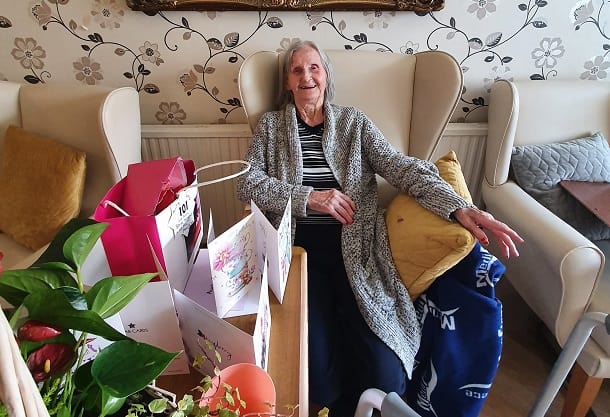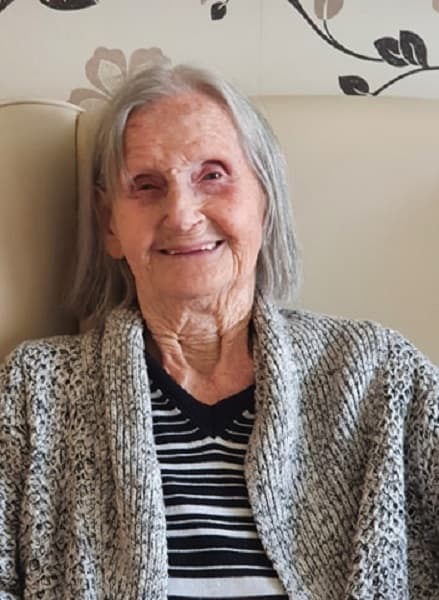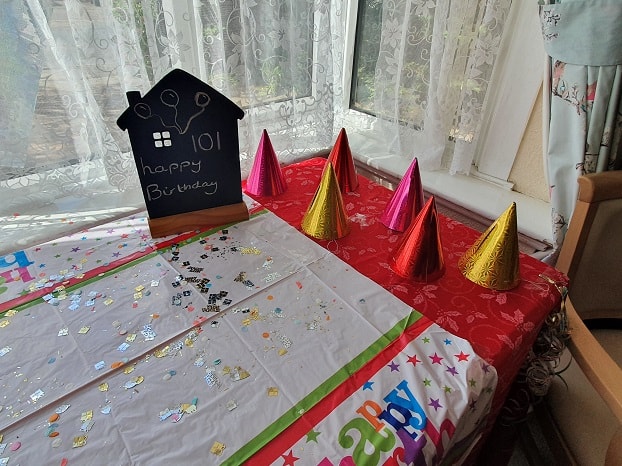
Margate resident Gladys Fruin marks her 101st birthday today (May 4).
She was born May 4, 1920 at 6 Park Place in Margate. Gladys also remembers living in Byron Avenue with parents George and Louise.
Gladys says she loved to pull pint behind the bar for her customers when she worked at the Belle Vue in Margate and at Nayland Rock. She also worked at the Seabathing in a small bar they had.

Gladys never married because she didn’t want “all that fuss” and doesn’t have any children but loves her nephews and wives Steve and Margaret, Bob and Jackie and Richard and her other relatives.
Gladys says her idol was her mum.
She says has reached her amazing age by working hard and, at times, had three jobs.
Gladys adds, with a cheeky grin, that she also liked making lots of money.
Asked what one thing is the most special to her, Gladys said: “I love to be around people but my family are my world.”

Gladys, who is a resident at Redcot Lodge in Margate, has celebrated her day with a window visit with her family, gifts including flowers and her favourite Daim bars and a cake made for her by her niece.
She is also due to have a party with residents at tea time.
In the year Gladys was born (1920)
The monarch was King George V
The Prime Minister was David Lloyd George with the Coalition.
Prince Albert (later George VI), having become Duke of York earlier in the year, meets Elizabeth Bowes-Lyon, who will become his wife in 1923 (and later Queen Elizabeth The Queen Mother).
January–November – experimental radio broadcasts including speech and music are made from a studio at the Marconi Company factory in Chelmsford, Essex
11 February – the Council of the League of Nations meets for the first time in London.
23 February – War Secretary Winston Churchill announces that conscripts will be replaced by a volunteer army of 220,000 men.
10 March – the Ulster Unionist Council accepts the Government’s plan for a Parliament of Northern Ireland.
17 March – Queen Alexandra unveils a monument to Nurse Edith Cavell in London.
27 March – Troytown wins the Grand National.
20 April–12 September – Great Britain and Ireland compete at the Olympics in Antwerp and win 15 gold, 15 silver and 13 bronze medals.
9 June – King George V opens the Imperial War Museum at The Crystal Palace.
3 July – the Scenic Railway (roller coaster) at Dreamland Margate opens, the first in the U.K.
16 July – World War I is officially declared over with Austria.
23 July – fourteen die and one hundred are injured in fierce rioting in Belfast.
22 September – the Metropolitan Police forms the Flying Squad, following an announcement on 17 February that their horses will be replaced by cars.
7 October – the first one hundred women are admitted to study for full degrees at the University of Oxford.
10 October – it is announced that compulsory hand signals are to be introduced for all drivers.
16 October – miners go on strike.
20 October – suffragette Sylvia Pankhurst is charged with sedition after calling upon workers to loot the London Docks.
8 November – Rupert Bear first appears in a cartoon strip in the Daily Express.
10 November – the body of The Unknown Warrior arrives from France aboard HMS Verdun for burial in Westminster Abbey.
11 November – King George V unveils the Cenotaph; The Unknown Warrior is buried.
21 November – Bloody Sunday: the Irish Republican Army, shoot dead fourteen British undercover agents in Dublin, most in their homes. Later this day in retaliation the Auxiliary Division of the Royal Irish Constabulary open fire on a crowd at a Gaelic Athletic Association Football match, killing thirteen spectators and one player and wounding 60
29 November – rationing imposed during World War I ends when the restriction on availability of sugar is lifted by the government.
23 December – Government of Ireland Act 1920, passed by the Parliament of the United Kingdom, receives Royal Assent providing for the partition of Ireland into Northern Ireland and Southern Ireland with separate parliaments

